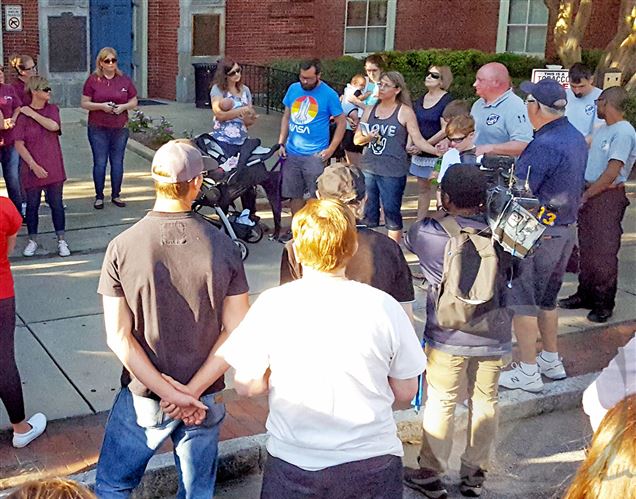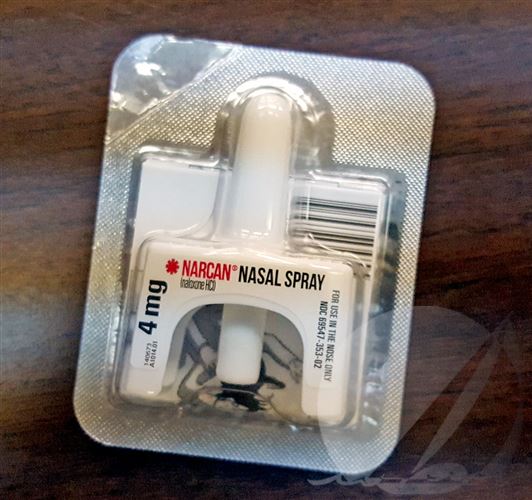By Chris Day
Multimedia Editor
Sunday, June 16, 2019
The Daily Advance Copyright 2019 APG East LLC. All rights reserved.
A recent surge in the number of heroin-related overdoses in Pasquotank County is shining a light on a powerful medication used to revive overdose patients.
The drug naloxone, known by its brand name Narcan, is an opiate-antagonist that blocks the effects of opioids, particularly in the case of an overdose. It can be administered either by an injection, intravenously or it can be spayed into the patient’s nose.
Area emergency medical personnel and law enforcement officers commonly carry the nasal spray form of Narcan. In the last few weeks, first responders have seen a spike in the number of overdose patients, particularly because of what law enforcement officials call a “bad batch” of heroin. That’s heroin that has been cut with the more potent and synthetic drug fentanyl.

In each instance Narcan was administered to the person who had overdosed, and in some cases the patient received more than one dose.
Olivia Doherty, an advanced emergency medical technician with Pasquotank-Camden Emergency Medical Services, said that as of 5 p.m. on Friday, EMS had responded to 18 overdose patients and administered 65 milligrams of Narcan in June. That’s more than one patient and nearly 5 milligrams of Narcan a day.
In two cases, the person who overdosed died, Doherty said.
The number of opioid and heroin-related overdoses so far in June is already way ahead of May, when, according to Doherty, 11 overdoses were reported and 33 milligrams of Narcan were administered.
At least one person who overdosed this month has agreed to seek treatment at an in-patient rehabilitation facility, Doherty said.
“He was ready to get help,” she said.
Doherty spoke during an interview following a meeting of the newly formed Post Overdose Response Team, or Port. About 30 emergency services and law enforcement personnel attended the meeting at Pasquotank-Camden EMS Thursday morning.
PORT is made up of law enforcement and emergency services personnel from three partnering counties: Camden, Perquimans and Pasquotank. The pilot program was funded by a $30,000 grant from the N.C. Office of Emergency Medical Services, according to Jonathan Nixon, director of Perquimans County Emergency Services.
The purpose of the program is to help reduce drug abuse in the three-county region.
Within 24 hours of a person having been treated with Narcan, an advanced EMT, like Doherty, or a paramedic, will follow up with the patient. The patient is assessed to determine any potential heart or lung complications that may have occurred as a result of the use of Narcan.

According to Nixon, one side effect of Narcan is pulmonary edema, or an accumulation of fluid in the lungs.
Another visit is paid within 72 hours to patients who frequently use illegal drugs. In that meeting the PORT team will share with the patient treatment and recovery resources and other options available to assist them.
“It’s really boots on the ground within 24 hours of when someone has an overdose,” Nixon said of the program.
Also representing Perquimans at Thursday’s meeting was Kate Thomas, a safety officer and shift supervisor for the county’s EMS. She said five overdoses have been reported in Perquimans since since May 31, and two of those patients are seeking treatment.
Thomas said there could have been unreported cases of overdoses. That’s because some homes where a person has recently overdosed already have Narcan available. In North Carolina, naloxone is sold in pharmacies without a prescription.
EMT personnel may also provide a kit with doses of Narcan to a patient or family members to have in the event of another overdose.
Thomas explained that opioids slow a person’s breathing. Too much of an opioid can result in an overdose, which left untreated can result in death.
Narcan must be administered as quickly as possible. When administered successfully, Narcan reverses the effects of the opioids and the patient’s breathing begins to return to normal. Thomas said it typically takes a few minutes for the patient to recover.
Some of the symptoms of an opioid-related overdose, according to Thomas, include bluish nails or lips, cold and clammy-feeling skin, shallow or irregular breathing or no breathing at all, snoring or gurgling sounds and extreme drowsiness.
Doherty discussed the resources available to addicts and their families in the area. Some treatment facilities are state-run and don’t require insurance, she said. Having insurance certainly helps, though, she added.
Keith Hamm, a community liaison for Integrated Family Services, said there are three area state-funded detoxification facilities, including one in Ahoskie. The other two are in Washington and Greenville.
Integrated Family Services is located in Greenville and specializes in mental health and substance abuse services.
Hamm also talked briefly about Mobile Crisis, a service provided by Integrated Family Services. A Mobile Crisis team member will visit with people who have a substance abuse problem and talk to them about the resources available, he said.
“We will send someone out even if the individual particularly doesn’t want to talk to us,” Hamm said.
That’s because once a Mobile Crisis official arrives the person realizes someone is trying to help them. They then become willing to talk, Hamm said.
Mobile Crisis will try to link the patient with services, treatment and detox resources and recovery support groups like Narcotics Anonymous.
“There’s no charge for Mobile Crisis,” Hamm said.
The phone number to reach Mobile Crisis is 1-866-437-1821.
Before concluding the meeting, Jerry Newell, director of Pasquotank-Camden EMS, pitched the idea of creating a telephone hotline. The hotline would be available around the clock for people to seek help when they feel they need it. Some times a person may not want to dial 911, he explained.
Newell said he thinks people would use the hotline, because area first responders are developing a good rapport with people who suffer from substance abuse.
“I do believe we are building trust with these people,” he said.

